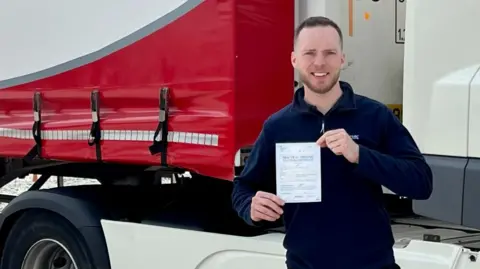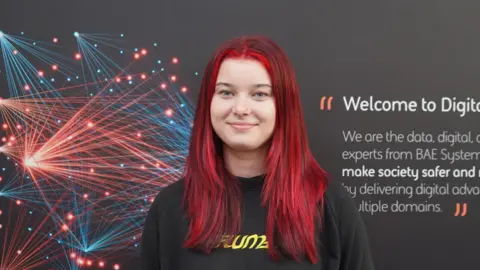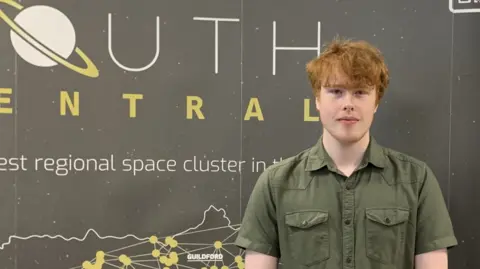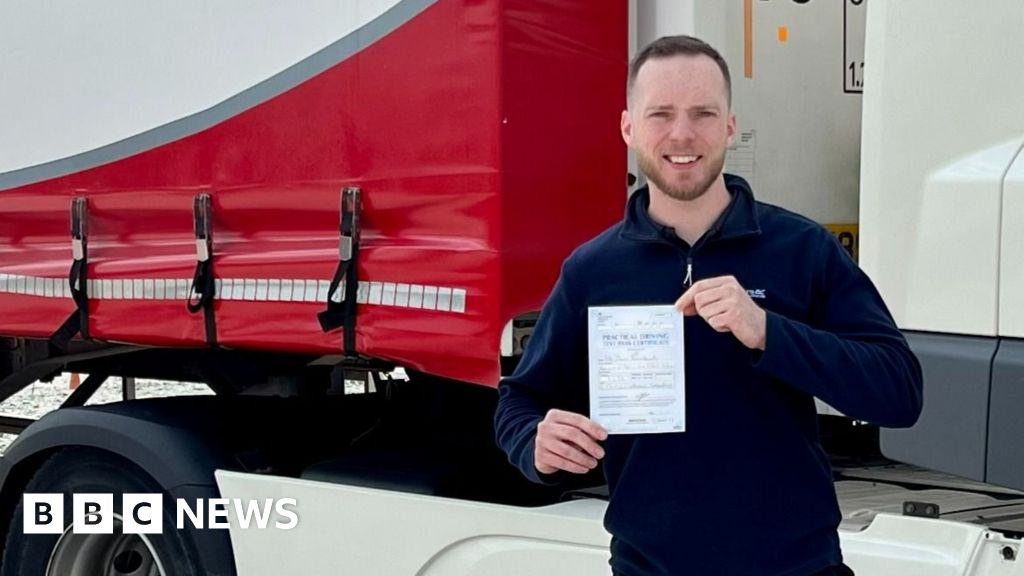Technology Reporter
 David Boutflour
David BoutflourDavid Boutflour’s background is as far from the glamour of space launches as it’s possible to imagine.
The 31-year-old worked in hospitality for nine years, becoming the general manager for a gastro-pub in Cheshire. But it wasn’t the real career for him. “I felt I could do more,” he says.
Mr Boutflour had been interested in space and aviation from a young age, mentioning Concorde as an early inspiration.
A course at Portsmouth University caught his imagination – the UK’s first Space Systems Degree Apprenticeship launched in conjunction with BAE Systems.
To build up funds to help pay for the course, he switched to lorry driving – a move which did not prepare his social circle for his change of direction.
“Everybody thought I was lying when I said I’d been accepted on this course. They thought I was pulling their leg, going from truck driver to space engineer!”
The four-and-a-half year course involves on-the-job learning at sites where BAE Systems designs and assembles satellites.
Back at Portsmouth they’ll be studying space systems engineering.
The academic side of the course consists of four modules, in thermodynamics, programming, digital systems and maths, all split between lectures and laboratory time.
 BAE Systems
BAE SystemsMr Boutflour is joined by four others on the apprenticeship.
One of those is Alice Overend.
Aged 21, she had already worked on satellite assembly and testing when she applied for the Portsmouth course.
This work involved the ill-fated Prometheus 2 satellites that were lost during a failed attempt to launch a satellite into space by Virgin Orbit in 2023.
This incident made a deep impression on her. “It was quite surreal, we were all watching the launch in the office and when the coverage ended we just went home.”
Unsuccessful satellite launches are part of life in the space business. But the Virgin Orbit loss stuck in the mind of other Portsmouth students. It stands for the risk element in space work.
Ms Overend’s background in satellite testing has given her a head-start in terms of understanding how a sprawling UK space industry fits together. “The whole space sector is going in a good direction.”
She explains the true meaning of “space systems” in her world.
“Systems is about making sure everything is where it should be, such as the satellite weight being precisely right.”
 BAE Systems
BAE SystemsGeorge Smith is the youngest of the group at 18, and joined the course straight from A levels in physics, maths and engineering.
In his home town of York he and some friends took apart an old lawn mower to build a go-kart out of the parts.
How did the go-kart perform? “It only wanted to turn to the right, but we learnt a lot about why it wasn’t working.”
Not everything in space exploration goes to plan either, but practical work like this is an integral part of the course.
“The apprenticeship appealed to me. I find studying and applying the lesson in practice means I learn better. So I was looking at degree apprenticeships and this course was a checklist of everything I wanted to do.”
Space is an expanding sector and he harbours a desire to get beyond earth’s atmosphere one day “if I can tick all the right boxes to become an astronaut”.
Right now the course is meeting his expectations. “To say it’s a dream come true is cheesy, but I’ve got in the door.”
 Getty Images
Getty ImagesElizabeth Seward is the head of space strategy at BAE Systems.
Despite her own background as a physicist, Ms Seward thinks people are put off this sector by a perception that it’s exclusively for rocket scientists.
“Space tends to get put on a pedestal. But the truth is we need more people from other backgrounds. A career here is for anyone interested in space, such as project managers or lawyers.”
The appeal of space is evident at Edinburgh’s Heriot-Watt University, where Dr Stephanie Docherty teaches orbital mechanics, how a satellite gets on the right path, as part of the aerospace course.
She agrees that specialisation is less important than aptitude in the space sector. “Employers want a problem solving mind-set. And I have noticed a real appetite from students for more space content in their course.”
Proposals to build rocket-launching sites in remote locations such as the Shetland Islands mean more positions should open up in the UK space industry in the very near future.
After the grounding of the Space Shuttle in 2011 Mr Boutfleur felt space exploration “took a step backwards.”
Now he says the success of Elon Musk’s SpaceX reusable launchers is enormously significant.
“Musk has very much re-ignited the space race”.
All three students agree that the hands-on side of the course is inspiring.
And outside of the space syllabus what do they get up to?
“Most of us play video games,” says Mr Smith, with Ms Overend nodding in agreement.
Scuba diving is another popular pastime. “We all like gaming,” says Mr Boutflour, “and scuba diving is good training for working in space.”


